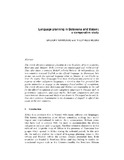| dc.contributor.author | Kamwendo, G.H. | |
| dc.contributor.author | Mooko, T. | |
| dc.date.accessioned | 2011-06-08T12:14:25Z | |
| dc.date.available | 2011-06-08T12:14:25Z | |
| dc.date.issued | 2006-11 | |
| dc.identifier.citation | Kamwendo, G.H. & Mooko, T. (2006) Language planning in Botswana and Malawi: a comparative study, International Journal of the Sociology of Language, Vol. 182, pp. 117-133 | en_US |
| dc.identifier.issn | 0165–2516 | |
| dc.identifier.uri | http://hdl.handle.net/10311/829 | |
| dc.description.abstract | The article discusses language planning in two Southern African countries,
Botswana and Malawi. Both countries are multilingual and multicultural.
They also share a common British colonial history. At independence, the
two countries retained English as the official language. In Botswana, Setswana
was made the national language while in Malawi, it was Chichewa.
Over the years, these languages have been developed and promoted at the
expense of other indigenous languages, a situation that has prompted linguistic
minorities to engage in the language-based politics of recognition.
The article discusses how Botswana and Malawi are responding to the call for the official recognition of more indigenous languages in domains such as
government, education, and mass media. Relevant comparisons and contrasts
between Botswana and Malawi are drawn in this regard in the article. One clear common denominator is the dominance of English in official domains in the two countries. | en_US |
| dc.language.iso | en | en_US |
| dc.publisher | Walter de Gruyter, http://www.degruyter.de | en_US |
| dc.subject | Language planning | en_US |
| dc.subject | Indigenous languages | en_US |
| dc.subject | Botswana | en_US |
| dc.subject | Malawi | en_US |
| dc.title | Language planning in Botswana and Malawi: a comparative study | en_US |
| dc.type | Published Article | en_US |
| dc.link | http://www.reference-global.com/loi/ijsl | en_US |

